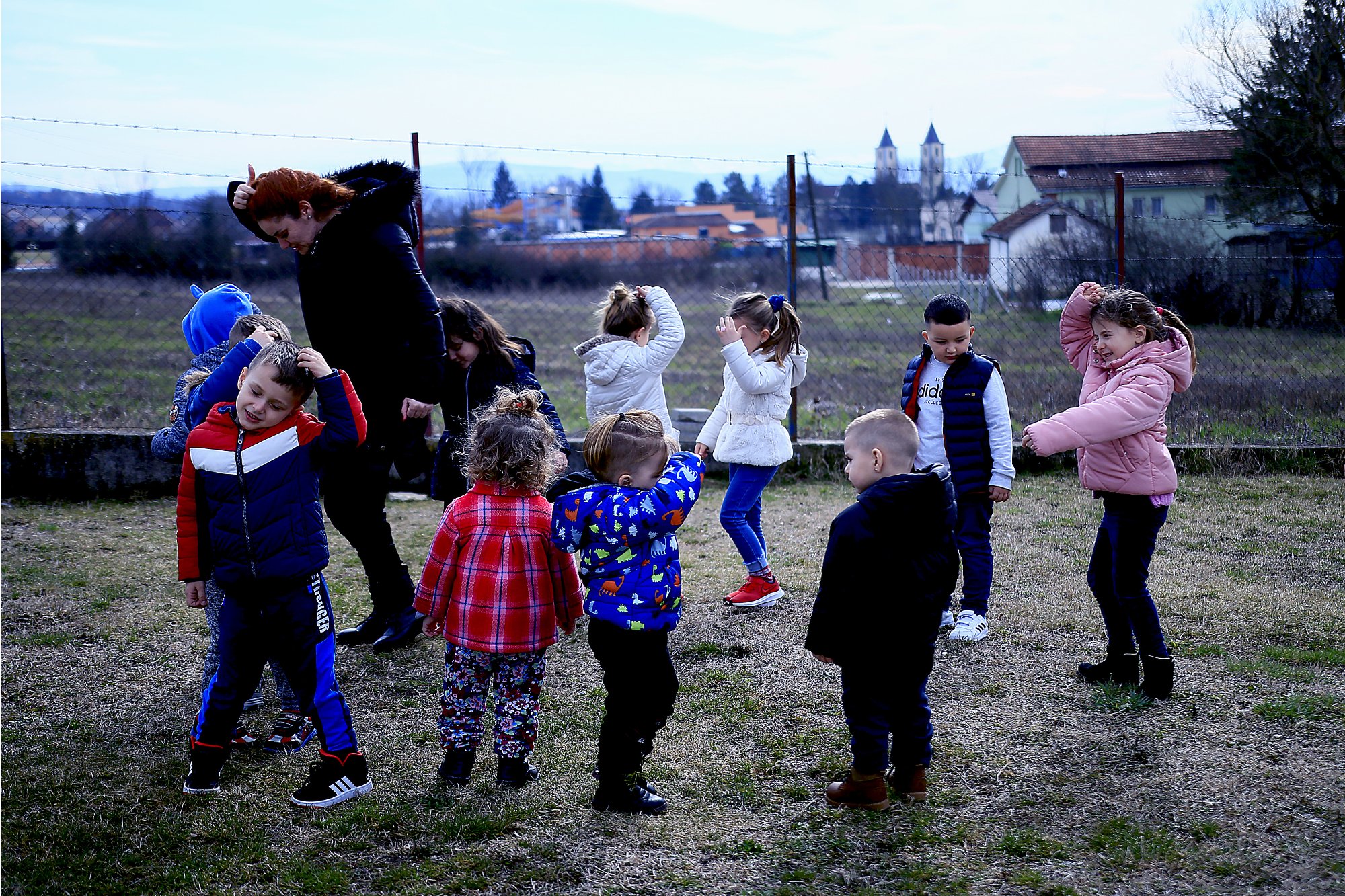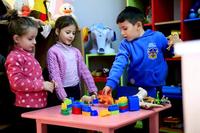
Outdoor activities in a Kosovo preschool (photo by Jeton Sopa)
An already fragile system, severely affected by the Covid-19 pandemic. We met educators and families from the 0-6 education sector in Kosovo
The COVID-19 pandemic has had multiple effects on Kosovo's educational system, especially for preschool institutions. Parents, educators, and heads of preschools in Kosovo explain how the pandemic has affected not only children and teachers, but also their families. Private preschools were most affected, as teachers and educators lost their job and income for several months.
Since the first COVID-19 case was registered in Kosovo on 13 March 2020, the government put restrictions on many activities throughout the country, including schools at all levels. During the first wave of the pandemic, preschool institutions locked down for three months.
Preschool institutions in Kosovo are grouped into three categories: private, public, and community-based institutions.
A struggling sector
According to Mevlude Murtezi – head of Childproof (CIPOF), a non-governmental organisation in Kosovo which deals with early childhood education – Kosovo is facing a complex phase in terms of its school and pre-school system.
"Early childhood education in Kosovo is organised according to still incomplete regulations. The law on early childhood education has been parked in parliament for many years, while teachers' education lacks an appropriate curriculum to tackle the needs of the 21st century", Murtezi told OBCT.
Over the last year, the pandemic has created further problems. Murtezi explains that children and their families have dealt with tremendous psychological pressure due to reclusion and financial uncertainty.
Unlike older children who continued their education through online platforms – at least in part – 0-6 children were initially left in the sole care of their family.
Later, Unicef supported the Ministry of Education and Science in developing and promoting the digital platform "Distance Education", designed to help not only children confined at home during the pandemic, but also those who are not enrolled in any preschool institution. The platform provides informative videos and articles for parents, and daily activity ideas for children aged 0-6. However, given the target age, this initiative managed to give only partial answers.
"The crisis hit children's development as teachers were unable to have a normal interaction with them. On the other hand, parents faced the increased stress of balancing work from home and at the same time making sure their children continued their education", notes Nora Latifi Jashari, a member of the parent's board at the Botanika community-based preschool in capital Pristina.
"The shutdown of kindergartens and the restrictive measures have created an extra burden for women, employed or unemployed, who stayed at home during this time more than men did. They had to manage their children's education and caregiving as well as all the rest".
Nora also notes that even before the pandemic Kosovo did not have a stable education system – several local and international reports state that Kosovo students lag behind when it comes to the quality of learning.
Speaking as a parent of a kid under six herself, Nora explains the struggle to meet children's needs in terms of their education, social interaction, and age-appropriate activities.
"During the lockdown, children clearly perceived the separation from their friends and teachers. They may have played with their siblings more, or played outdoors more, but the lack of daily interaction with their teachers had a great impact on their development", explains Nora, highlighting how the lack of peer socialisation has led children to spend more time in front of a screen.
This has had surprising consequences: "in Kosovo there is not much online Albanian educational content available, therefore children followed online activities in different languages, which had a great impact on their language skills. Sometimes they express themselves in English better than in their mother’s tongue, Albanian", says Nora.
Among children
Everything looks calm at the Margherita Kids preschool in Zllakuqan – a small village in the Klina municipality in north-western Kosovo – which hosts approximately 30 kids aged 1 to 6. We talk to a teacher, under the careful gaze of the children engaged in their free activity outdoors. She tells us that even the youngest ones perceived that we are living in times of confusion.
Sehadete Sejdiu, a teacher with the CIPOF organisation who works in the preschool in the municipality of Fushe Kosova, describes for OBCT the challenges that teachers and children faced during the pandemic: "we respected the government’s decision to shut down schools, but we continued to work from home. We prepared different activities for parents to do with their kids".
However, this was not easy or without consequences. When school reopened in May 2020, Sejdiu noticed that many children showed little interest for educational activities and had lost their daily routines.
Pedakos
RTM supports early childhood in Kosovo with its project PEDAKOS . The sector has a significant impact on both the education and the social inclusion of children.
The OECD's “PISA 2018 – Programme for International Student Assessment” places Kosovo at the 76th position out of a total of 78 education systems monitored, signalling the need for an overall reform of the education system. The document has pushed public institutions and local civil society, together with the international community, to take an interest in the preschool sector.
The activities of RTM and its local and Italian partners focus on the professional training of preschool staff; on the dissemination of good practices by supporting 15 pilot preschools in exploring an educational approach based on the protection and promotion of the rights and potential of children, the Reggio Emilia Approach®; and on encouraging the participation of public, private, and community preschools and other institutions in the definition of sector policies.
As OBC Transeuropa, we are supporting Pedakos by producing journalistic content with articles and multimedia products.
To investigate the issue, we met the school staff and families of some of the pilot preschools involved in PEDAKOS, an intervention funded by the Italian government through the Italian Agency for Development Cooperation (Aics).







